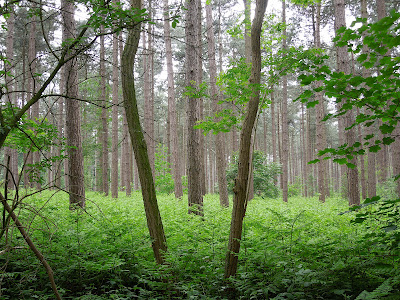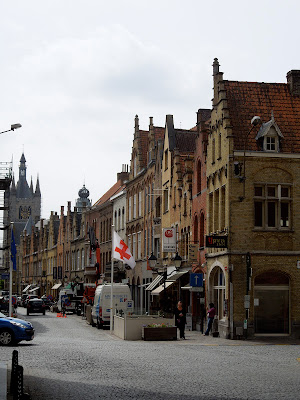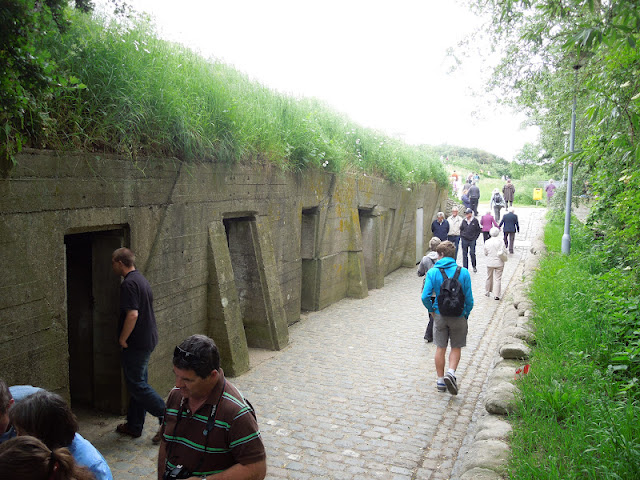Wednesday in Bruges.
We decided to climb Belfort, the very tall and reasonably famous belltower
dominating the Markt. But before that we slept in AGAIN and this time didn’t
even leave the hotel until the day was well under way. We went to have lunch,
with the intention of going to the place we had the Belgian waffles at, but it
was closed. Alas! A spanner in the works. We wandered around for quite a bit
not being able to decide what to eat before just settling on Quick, a European
fast food chain. It was okay I guess.
So, Belfort – 366
windy, narrow, old steps to the top. Again, due to the wonderful fact that we
are under 26 we got in for cheap. The current belltower was built in the 1700s,
I believe, however there was a tower there for a few hundred years before that
– the old one was struck down in the most dramatic fashion by a bolt of
lightning that caused it to collapse. Apparently back in the day bells were
used to send signals to the people of the town, like ‘time to go to work!’ and
‘Quittin tiiime!’ and ‘Yay good news!’ and ‘oh no, something bad has happened’.
Despite the huge number of stairs it wasn’t so bad – there are a few levels at
which to stop and look around, like the Treasury in which the town charters
were kept behind gates with numerous locks, and each key for each lock was
given to a different person so they all had to be present to open them. The
higher you go in the tower the narrower the stairs, but once at the top there
is quite a nice view over Bruges, and a lot of bells of different sizes that
seem to ring constantly for different reasons. Nowadays the only messages sent
by Bell are ‘it’s a quarter past the hour,’ ‘it’s half past the hour,’ ‘it’s
nearly a quarter to the hour,’ ‘now it’s a quarter to the hour’ etc. So we
heard a couple of different chimes whilst on our way up and at the top of the
tower. We heard the hour struck on our way down – it was pretty loud. I’m glad
we weren’t at the top for that one.
Up up up to Belfort!
The treasury room at the bottom-ish of the tower with its fancy locking gates. It has a cool floor.
Spiral stairs!
Belfort's courtyard from a bit up the tower.
Looking up in Belfort
More stairs.
Some of the chimes are played like a giant music box.
Cogs and stuff.
A fairly big bell, but not the biggest by a long way.
Made it to the top!
The view over Bruges.
Another big bell and a few smaller bells you can see.
Back down on lovely,
solid ground again (mind you, despite the height of the tower I was not too
scared at all! I guess it’s all enclosed so you don’t know how far from the
ground you’re heading until you’re up there, and then you’re down before you
know it!), we headed off to see if the elusive doggy-at-the-window was there –
and it was!! Finally we saw it sleeping on its cushion, and it was very cute
and I am glad it really exists.
Yaaaay, the famous doggy in the window by the canal!!
We wandered to the
Hospitaalmuseum next, which is a hospital museum (go figure!) in the chapel of
the old Sint Janshospitaal, an old hospital run by nuns that dates back to the
12th Century. It was pretty interesting actually. They had some old
medical instruments, old store cabinets, some medical books from the 15th
and 16th Centuries, very old accounts documents dating as far back
as the 1300s, and sedan chairs used to transport the patients to the hospital.
There were also some medically themed paintings, including one of Sint
Janshospitaal in the 18th Century, in which you can see the beds,
patients, nuns, doctors and even one of the sedan chairs. Very interesting! But
possibly my favourite part was a restored 17th Century pharmacy
which was very cool!
Wandering to Hospitaalmuseum
Down beside Sint Janshospitaal
The apothecary/pharmacy. Can you find Mads?
Courtyard and well - I think it used to belong to nuns or monks, one of the two.
Outside of the Hospitaalmuseum
We headed back to the
hotel as we needed to check on our reservation for a Flanders Fields tour,
which was lucky as we had to call them to confirm our places. We also had a
relax and then went to see Moonrise Kingdom at a little cinema where each
theatre is colour coordinated!! We were in the Red room, so we got a little red
ticket and all the walls and chairs were red. The world just feels right when
it’s colour coordinated. The film was very, very good too – super dooper cute
and exceptionally quirky. It receives a Highly Recommend rating from yours
truly, who is, of course, a very well respected film critic. For dinner we had
Ben and Jerry’s. We are such healthy people. But it was delicious.
Pretty! Restaurants at Markt at night.
On Thursday we had the
only freezing day of our Bruges trip (which we were thoroughly unprepared for),
and we went on an excellent bus tour to Flanders Fields, to visit some WWI
sites there. The tour was run by Quasimodo, yet another Highly Recommend rating
for them! Our guide Phillipe had so much knowledge, so as well as being very
moving and very beautiful, the day was very educational as well! Hooray for
learning things. There were about 30 people on our bright blue bus, a very good
number I think.
Basically the tour was
focused on the Ypres Salient, travelling mostly along the Passchendaele Ridge.
Apparently a salient is a military term for the dangerous situation when a part
of your army pushes through the enemy’s front line to create a sort of bow
shape, giving the enemy the opportunity to attack from three sides. See,
learning! This is where a lot of fierce fighting took place throughout the four
years of the war, as the Allies tried to keep Germany from crossing the border
between Belgium and France, and many, many men were killed in the war of
attrition.
A monument to the Canadians who held their line in the first German gas attacks.
Our first stop was
Langemark, a German cemetery where over 44,000 soldiers are buried. It’s quite
sad, really, because it seems so uncared for and forgotten. Even though they
were the enemy in Belgium, they were young men with families the same as every
other soldier, living and dying in awful conditions. There are granite stones
on the ground marking the graves, each grave holding three or four soldiers,
and there is a large, dead garden marking a mass grave which reportedly holds
the bodies of around 22000 men. These are numbers you can’t even fathom, and
the thing about Flanders is that there are these huge war cemeteries
EVERYWHERE. We went to Tyne Cot Cemetery later in the day, which is the final
resting place for over 12,000 British and Commonwealth troops (including Aussie
diggers), and the names of a further 35,000 missing (whose bodies were never
found or identified) on a wall around the cemetery. Driving up to it there is
just a sea of white headstones – it is a very peaceful place, with beautiful
lawns and flowers growing on the graves. There is a new visitor’s centre there,
which has an eerie voice reading out the names of the dead, and a few personal
effects of soldiers who are buried at Tyne Cot. One particularly moving relic
is a letter written to a soldier from his wife, dated the day he actually died.
As if this wasn’t tragic enough, the letter speaks of a friend of theirs,
Walter, who returned from the front on leave a changed man: not wanting to see
or talk to anyone.
Langemark German Cemetery
Names inside a monument at Langemark
The approach to Tyne Cot Cemetery.
A German bunker left at Tyne Cot
Australian headstones at Tyne Cot
There are so many names of the missing.
Letter to George Smith from his wife, dated the same day he died.
We went to a couple of
battlefields, including Polygon Wood where there is a large monument to the
Aussies who fought, and Hill 60, a fiercely fought-over hill on the Passchendaele
Ridge that was blown to pieces by mines in tunnels dug deep under the German
lines. We also saw how WWI is still impacting the farmers working on Flanders
Fields, with a few unexploded shells that have been found, lying by the side of
the road waiting collection by the bomb squad (apparently farmers in the area
have the bomb squad on speed dial). Occasionally they blow up and people still
get wounded by them. When it rains you can apparently find a lot of shrapnel in
the ground: it’s crazy how much there is left over, so many years later! And
it’s plain to see how much when you go to the Hooge Crater war museum, which is
where we have lunch. A private museum, it is full to the brim of relics from
the war: uniforms, weapons, helmets, binoculars, bugles, shells, bottles, gas
masks; everything even down to cigarettes and matches and absolutely everything
you could think of! It’s actually a really good museum.
Shells by the side of the road
Souvenirs - shrapnel fished out of the ground. Apparently these came from shells filled with them, very nasty. We got to keep one each.
The Australian monument at Polygon Wood.
Polygon Wood. Such a pretty place.
Creepy gas masks at the Hooge Crater museum
Aussie slouch hat, Hooge Crater Museum
German helmets
Shells. This is half of the second of two cases absolutely chock-a-block full of them
Artillery
Out the front, Hooge Crater Museum.
Hill 60. Or at least what's left of it. The battlefield has been preserved as a war grave.
The leftovers of a mine at Hill 60
In the crater at Hill 60
A British bunker left over at Hill 60. There were a few bunkers, this one changed hands at least twice I believe.
We went into a
restored trench in the middle of an industrial estate – the past and present existing
side by side! There is a dugout there that has been excavated, but you can’t go
in unless you bring your scuba gear as it is completely flooded. Apparently a
few years ago they found the remains of over 200 soldiers when they were
building the warehouse next door. It’s just insane the number of dead lying all
over the place, from just four years! I had a real wow moment at the Menin Gate
in the city of Ypres (or Ieper to the Belgians. I kept seeing road signs and
read them as ‘Leper’, wondering why anyone would want to live in a town called
‘Leper’) – it is an absolutely massive monument with the names of all the
missing inscribed on it. Just those whose bodies were never found. And there
are names ALL OVER IT. Every single bit of wall is covered in names. Suddenly
you realise just how many men died in just this one part of the war and all for
absolutely nothing. It’s completely tragic and completely stupid.
Into the trenches
The opening to the dugout.
Here you can see the zig zag pattern of the reconstructed trench. The gravel marks out where the dugout is underground. There are a few rooms and corridors down there.
The huge Menin Gate
Every night in Ypres they play the last post for every soldier who's body has never been found or identified. They're still going, and won't be stopping anytime soon.
Names on the walls of the Menin Gate.
The rebuilt city of Ypres.
A monument at John McCrae's dressing station.
Inside the dressing station bunker where John McCrae worked.
Inside the dressing station bunker.
The dressing station bunker from outside.
More graves.
This soldier died at the age of 15.
Our last stop was at a
dressing station bunker, where John McCrae worked and wrote the famous poem ‘In
Flanders Fields.’ For the whole trip Mads has been dreaming of lying in a field
of daisies. So we found some daisies in a field, and I thought it would be a
good idea to fulfil Mads’s dream and lie in them. However, about two steps into
the field and Mads’s legs started stinging from some kind of plant. Luckily we
got out before we had flopped down, it could have been very unfortunate
indeed!!
Retreat!!
Back to Bruges, I feel
fast asleep on the bus. We walked through the now rain to Pizza Hut for dinner
and chocolate mousse for dessert (on the house, awesomo!!). Then back to the
hotel to pack and prepare to say goodbye to Bruges.
Friday. The weirdest
days are those when you awake in one country, and go to bed in another. We
walked from the hotel to the train station, dragging our heavy wheelie
suitcases behind us (a fair effort, actually). We got there just in time to
catch the train to Brussels Midi before changing to get to Brussels National
Airport. A bit worried about the weight of my suitcase, I was amazed and
relieved to find it only weighs 21kgs!! That’s way underweight, excellente! We
had two flights to Rome, going via Barcelona (I know, it’s completely out of
the way but it was a cheap flight!). A very funny ‘lost in translation’ moment
at Barcelona airport: at Maccas we had all the food on our tray except for my
burger. The guy serving us put my burger on another tray and goes ‘I bring to
your table.’ Okay, well that’s exceptionally good service for a Maccas, I mean,
we could probably find our own table and fit the burger on our tray easily, but
whatevs! We’re in Spain!’ So we followed the dude with our tray, around and
around in circles, past heaps of empty tables, him sort of turning around to
look at us every now and then, a few other workers and some customers looking
at us sort of funny. Eventually I got a bit tired of the game, so said ‘we’ll
just sit here’ and pointed to an empty table. Again he said ‘I bring to your
table’. The penny dropped – the burger was for someone else he was looking for,
he was going to bring my burger to us at our table because there’d be a wait on
it. We were like a bunch of ducklings. OMG, talk about a couple of losers
following this poor dude around the restaurant, we were a bit embarrassed and
sat in fits of laughter the whole rest of the time we were there!
Barcelona from the airport
A very memorable maccas visit
We landed in the
Eternal City at around 9pm. The flights were fine, a bit of turbulence out of
Brussels that had me gripping the arms of my chair, but I did okay! And now we
are in Rome! It’s been a dream of mine for a long time to come to Rome! To
Italy! I can hardly believe it! We got a very expensive taxi to our hotel after dodging a few very enthusiastic fellows trying to sell us taxi rides. The driver lifted up Mads's suitcase exclaiming 'Mamma Mia!!' He he, I love it that Italians really say Mamma Mia. I think I'm going to like it here! The hotel is quite nice, but full to the brim of tour groups! More on our adventures in Rome later...
Sunset flying in to Rome.




























































No comments:
Post a Comment